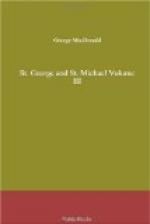CHAPTER XXII.
The cataract.
In the midst of a great psalm, on the geyser column of which his spirit was borne heavenward, young Delaware all of a sudden found the keys dumb beneath his helpless fingers: the bellows was empty, the singing thing dead. He called aloud, and his voice echoed through the empty chapel, but no living response came back. Tom Fool had grown weary and forsaken him. Disappointed and baffled, he rose and left the chapel, not immediately from the organ loft, by a door and a few upward steps through the wall to the minstrels’ gallery, as he had entered, but by the south door into the court, his readiest way to reach the rooms he occupied with his father, near the marquis’s study. Hardly another door in either court was ever made fast except this one, which, merely in self-administered flattery of his own consequence, the conceited sacristan who assumed charge of the key, always locked at night. But there was no reason why Delaware should pay any respect to this, or hesitate to remove the bar securing one-half of the door, without which the lock retained no hold.
Although Tom had indeed deserted his post, the organist was mistaken as to the cause and mode of his desertion: oppressed like every one else with the sultriness of the night, he had fallen fast asleep, leaning against the organ. The thunder only waked him sufficiently to render him capable of slipping from the stool on which he had lazily seated himself as he worked the lever of the bellows, and stretching himself at full length upon the floor; while the coolness that by degrees filled the air as the rain kept pouring, made his sleep sweeter and deeper. He lay and snored till midnight.
A bell rang in the marquis’s chamber.
It was one of his lordship’s smaller economic maxims that in every house, and the larger the house the more necessary its observance, the master thereof should have his private rooms as far apart from each other as might, with due respect to general fitness, be arranged for, in order that, to use his own figure, he might spread his skirts the wider over the place, and chiefly the part occupied by his own family and immediate attendants—thereby to give himself, without paying more attention to such matters than he could afford, a better chance of coming upon the trace of anything that happened to be going amiss. ‘For,’ he said, ’let a man have ever so many responsible persons about him, the final responsibility of his affairs yet returns upon himself.’ Hence, while his bedroom was close to the main entrance, that is the gate to the stone court, the room he chose for retirement and study was over the western gate, that of the fountain-court, nearly a whole side of the double quadrangle away from his bedroom, and still farther from the library, which was on the other side of the main entrance—whence, notwithstanding, he would himself, gout permitting, always fetch any book he wanted. It was, therefore, no wonder that, being now in his study, the marquis, although it rang loud, never heard the bell which Caspar had hung in his bedchamber. He was, however, at the moment, looking from a window which commanded the very spot—namely, the mouth of the archway—towards which the bell would have drawn his attention.




